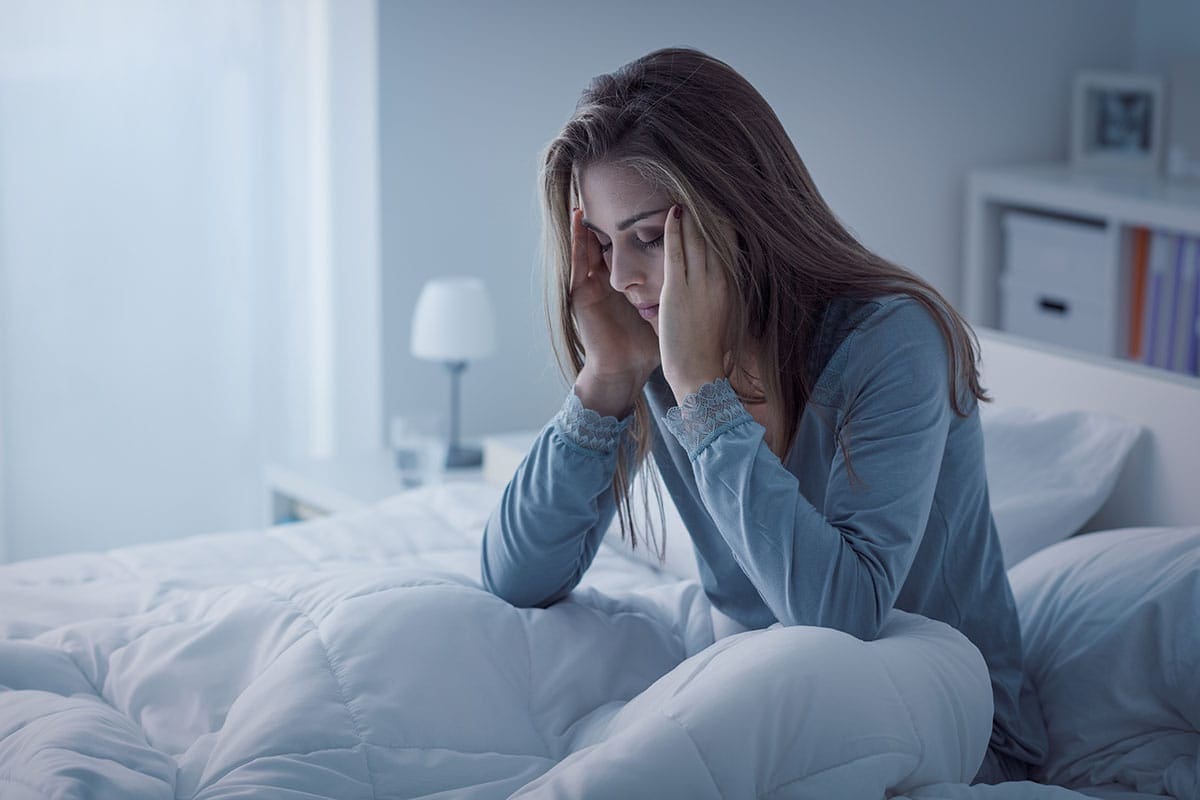Say Goodbye to Insomnia & Start Enjoying Quality Sleep
Can individuals with insomnia find various ways to reduce its effects, such as a full night’s rest and promoting healthy sleep habits?
Insomnia
Many people have often struggled to get a full night’s sleep occasionally, as environmental factors can keep them from falling asleep, making them tired throughout the day. In most cases, many individuals sometimes suffer from a chronic condition known as insomnia. Insomnia is a common sleep disorder, whether short-term or chronic, and it can negatively impact a person’s ability to sleep and stay asleep. (Dopheide, 2020) Insomnia can be in two forms: primary and secondary. Primary insomnia is a fairly common condition that can be resolved without treatment, while secondary insomnia is due to medication side effects or neurological issues that are causing sleep issues. Additionally, insomnia can be developed through various environmental factors like genetic variants, early life stress, major life events, and brain functions and structures that can cause individuals to be vulnerable and have insomnia. (Van Someren, 2021) We associate with certified medical providers who inform our patients of the effects of insomnia that can affect the body when they are not getting enough sleep. While asking important questions to our associated medical providers, we advise patients to incorporate healthy sleeping habits into their treatment plan to reduce insomnia and get proper sleep. Dr. Alex Jimenez, D.C., envisions this information as an academic service. Disclaimer.
How It Affects The Body

So, how does insomnia affect the body and a person’s daily routine? Well, when environmental factors start to impact a person, it can cause overlapping risk profiles in the body that can develop into mental disorders like depression. There is a bi-directional relationship between insomnia and depression, as it can cause sleep alterations that can affect the nervous system and develop into chronic conditions. (Riemann et al., 2020) Some of the symptoms that insomnia can affect the body include: (Naha et al., 2024)
- Fatigue
- Memory impairment
- Cardiovascular disorders
- Gastrointestinal disorders
- PTSD
- Daytime napping
However, there are ways to manage insomnia and reduce the co-morbidities.
Exploring Integrative Medicine-Video
Ways To Manage Insomnia
When managing and treating insomnia, many people must recognize the many environmental factors that can lead to its development. Since insomnia is linked with environmental factors, many people start making small routine changes to mitigate its effects. Many people can start by identifying the disorder and other co-morbidities contributing to its development. (Waterman & Selsick, 2023) This, in turn, helps doctors develop a customized treatment plan to manage their insomnia.
Sleep Habits
One of the ways many people deal with insomnia can begin with changing their sleep habits to help reduce the environmental factors affecting their sleep quality. Some of the changes include:
- Sleeping on a comfortable mattress
- Reduce screen time by an hour before bed
- Maintain a regular sleep and waking schedule
- Make sure the bedroom is dark, cool, and has minimal noise
Incorporating these small changes in sleeping habits can help reduce the stressors contributing to insomnia.
Non-Surgical Treatments
Another way for individuals to manage their insomnia is by incorporating non-surgical treatments. Non-surgical treatments like mindfulness meditation, chiropractic care, and acupuncture can help many individuals calm the mind and body by combining deep breathing exercises. (Chan et al., 2021) At the same time, the body and muscles can begin to relax and even help stretch out tense muscles that are affected by insomnia. Many people can utilize non-surgical treatments as part of their routine to live healthy lives and have the best quality of sleep they deserve.

References
Chan, N. Y., Chan, J. W. Y., Li, S. X., & Wing, Y. K. (2021). Non-pharmacological Approaches for Management of Insomnia. Neurotherapeutics, 18(1), 32-43. https://doi.org/10.1007/s13311-021-01029-2
Dopheide, J. A. (2020). Insomnia overview: epidemiology, pathophysiology, diagnosis and monitoring, and nonpharmacologic therapy. Am J Manag Care, 26(4 Suppl), S76-S84. https://doi.org/10.37765/ajmc.2020.42769
Naha, S., Sivaraman, M., & Sahota, P. (2024). Insomnia: A Current Review. Mo Med, 121(1), 44-51. https://www.ncbi.nlm.nih.gov/pubmed/38404423
Riemann, D., Krone, L. B., Wulff, K., & Nissen, C. (2020). Sleep, insomnia, and depression. Neuropsychopharmacology, 45(1), 74-89. https://doi.org/10.1038/s41386-019-0411-y
Van Someren, E. J. W. (2021). Brain mechanisms of insomnia: new perspectives on causes and consequences. Physiol Rev, 101(3), 995-1046. https://doi.org/10.1152/physrev.00046.2019
Waterman, L., & Selsick, H. (2023). Insomnia and its treatment should be given more importance. Br J Gen Pract, 73(733), 344-345. https://doi.org/10.3399/bjgp23X734421
Disclaimer
Post Disclaimer
General Disclaimer, Licenses and Board Certifications *
Professional Scope of Practice *
The information herein on "Say Goodbye to Insomnia & Start Enjoying Quality Sleep" is not intended to replace a one-on-one relationship with a qualified health care professional or licensed physician and is not medical advice. We encourage you to make healthcare decisions based on your research and partnership with a qualified healthcare professional.
Blog Information & Scope Discussions
Welcome to El Paso's Premier Wellness and Injury Care Clinic & Wellness Blog, where Dr. Alex Jimenez, DC, FNP-C, a Multi-State board-certified Family Practice Nurse Practitioner (FNP-BC) and Chiropractor (DC), presents insights on how our multidisciplinary team is dedicated to holistic healing and personalized care. Our practice aligns with evidence-based treatment protocols inspired by integrative medicine principles, similar to those on this site and on our family practice-based chiromed.com site, focusing on naturally restoring health for patients of all ages.
Our areas of multidisciplinary practice include Wellness & Nutrition, Chronic Pain, Personal Injury, Auto Accident Care, Work Injuries, Back Injury, Low Back Pain, Neck Pain, Migraine Headaches, Sports Injuries, Severe Sciatica, Scoliosis, Complex Herniated Discs, Fibromyalgia, Chronic Pain, Complex Injuries, Stress Management, Functional Medicine Treatments, and in-scope care protocols.
Our information scope is multidisciplinary, focusing on musculoskeletal and physical medicine, wellness, contributing etiological viscerosomatic disturbances within clinical presentations, associated somato-visceral reflex clinical dynamics, subluxation complexes, sensitive health issues, and functional medicine articles, topics, and discussions.
We provide and facilitate clinical collaboration with specialists across disciplines. Each specialist is governed by their professional scope of practice and licensure jurisdiction. We use functional health & wellness protocols to treat and support care for musculoskeletal injuries or disorders.
Our videos, posts, topics, and insights address clinical matters and issues that are directly or indirectly related to our clinical scope of practice.
Our office has made a reasonable effort to provide supportive citations and has identified relevant research studies that support our posts. We provide copies of supporting research studies upon request to regulatory boards and the public.
We understand that we cover matters that require an additional explanation of how they may assist in a particular care plan or treatment protocol; therefore, to discuss the subject matter above further, please feel free to ask Dr. Alex Jimenez, DC, APRN, FNP-BC, or contact us at 915-850-0900.
We are here to help you and your family.
Blessings
Dr. Alex Jimenez DC, MSACP, APRN, FNP-BC*, CCST, IFMCP, CFMP, ATN
email: [email protected]
Multidisciplinary Licensing & Board Certifications:
Licensed as a Doctor of Chiropractic (DC) in Texas & New Mexico*
Texas DC License #: TX5807, Verified: TX5807
New Mexico DC License #: NM-DC2182, Verified: NM-DC2182
Multi-State Advanced Practice Registered Nurse (APRN*) in Texas & Multi-States
Multi-state Compact APRN License by Endorsement (42 States)
Texas APRN License #: 1191402, Verified: 1191402 *
Florida APRN License #: 11043890, Verified: APRN11043890 *
Colorado License #: C-APN.0105610-C-NP, Verified: C-APN.0105610-C-NP
New York License #: N25929, Verified N25929
License Verification Link: Nursys License Verifier
* Prescriptive Authority Authorized
ANCC FNP-BC: Board Certified Nurse Practitioner*
Compact Status: Multi-State License: Authorized to Practice in 40 States*
Graduate with Honors: ICHS: MSN-FNP (Family Nurse Practitioner Program)
Degree Granted. Master's in Family Practice MSN Diploma (Cum Laude)
Dr. Alex Jimenez, DC, APRN, FNP-BC*, CFMP, IFMCP, ATN, CCST
My Digital Business Card
Licenses and Board Certifications:
DC: Doctor of Chiropractic
APRN: Advanced Practice Registered Nurse
FNP-BC: Family Practice Specialization (Multi-State Board Certified)
RN: Registered Nurse (Multi-State Compact License)
CFMP: Certified Functional Medicine Provider
MSN-FNP: Master of Science in Family Practice Medicine
MSACP: Master of Science in Advanced Clinical Practice
IFMCP: Institute of Functional Medicine
CCST: Certified Chiropractic Spinal Trauma
ATN: Advanced Translational Neutrogenomics
Memberships & Associations:
TCA: Texas Chiropractic Association: Member ID: 104311
AANP: American Association of Nurse Practitioners: Member ID: 2198960
ANA: American Nurse Association: Member ID: 06458222 (District TX01)
TNA: Texas Nurse Association: Member ID: 06458222
NPI: 1205907805
| Primary Taxonomy | Selected Taxonomy | State | License Number |
|---|---|---|---|
| No | 111N00000X - Chiropractor | NM | DC2182 |
| Yes | 111N00000X - Chiropractor | TX | DC5807 |
| Yes | 363LF0000X - Nurse Practitioner - Family | TX | 1191402 |
| Yes | 363LF0000X - Nurse Practitioner - Family | FL | 11043890 |
| Yes | 363LF0000X - Nurse Practitioner - Family | CO | C-APN.0105610-C-NP |
| Yes | 363LF0000X - Nurse Practitioner - Family | NY | N25929 |
Dr. Alex Jimenez, DC, APRN, FNP-BC*, CFMP, IFMCP, ATN, CCST
My Digital Business Card

